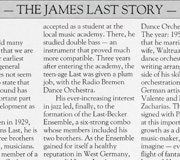ARTICLE: THE JAMES LAST STORY - UK PROGRAM TOUR 1981
- THE JAMES LAST STORY -
It has been said many times, many ways, that we are all a product of our earliest environment and general background. It does not seem at all far-fetched to state that James' own background has played a most important part in his startling development as a multi-talent.
Born in Bremen in 1929, and christened Hans Last, he is the youngest of three brothers - all, interestingly, musicians. (Robert Last was a member of a previous James Last Orchestra before leaving to put together his own successful outfit; Werner is infinitely better known as Kai Warner, a successful bandleader-writer in his own right). At first, sport was young Hans' major proccupation. However, he did take piano lessons from an early age, even though he wasn't exactly a willing - or even totally succesfful! - pupil. But by 14 he had obviously improved sufficiently to be accepted as a student at the local music academy. There, he studied double bass - an instrument that proved much more compatible. Three years after entering the academy, the teen-age Last was given a plum job, with the Radio Bremen Dance Orchestra.
His ever-increasing interest in jazz led, finally, to the formation of the Last-Becker Ensemble, a six-strong combo whose members included his two brothers. As the Ensemble gained for itself a healthy reputation in West Germany, so too did James Last's own prowess as bassist earn for him plaudits from critics, fans and fellow musicians alike. For three years running - 1950-1952 - he was selected as West Germany's Number One bass player in a local jazz poll. But this was to be only one facet of a burgeoning talent which kept improving all the time, and - this is most significant - gradually widening in its scope. A signal event was his joining the North German Radio Dance Orchestra in Hamburg. The year: 1955. The same year that he married his delightful wife, Waltruad. With the dance orchestra, he began writing arrangements. That side of his skills developed with orchestrations for such top German artistes as Caterina Valente and Helmut Zacharias. Then, in 1964, he signed with Polydor. But even at this important stage in his growth as a distinguished music-maker, how could he imagine - even in some wild flight of fantasy - that one day he would be saluted as a recording artiste with an unparallelled number of Gold Disc awards for albums alone! (It is almost frightening to realise that quite some time has passed since he was presented with his 100th such Gold Disc trophy - which at that time signalled worldwide LP sales well in excess of 25,000,000 units. And the 150th award came out about in more recent times...)
